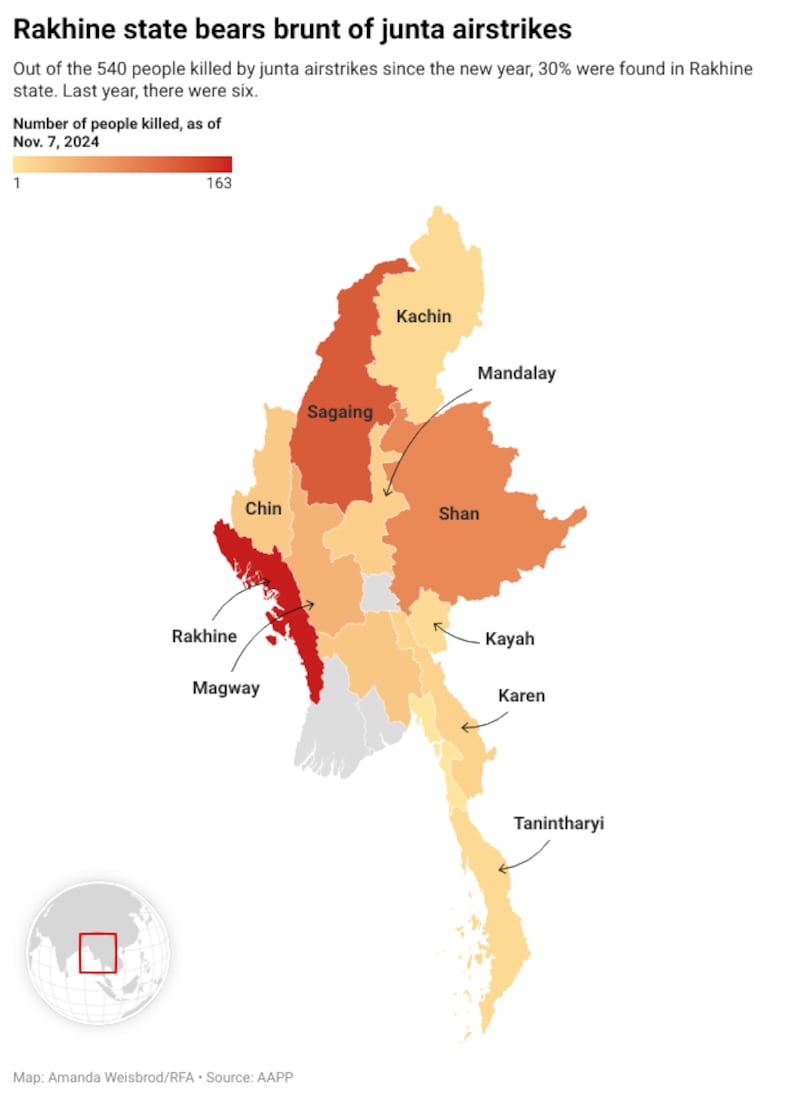
At least 540 civilians were killed by junta airstrikes in Myanmar in the first 10 months of the year, with the most deaths occurring in war-torn Rakhine state, according to a group monitoring conflict in the southeast Asian nation.
The tally by the Assistance Association for Political Prisoners, or AAPP, came as the United Nations Development Program warned in a report that Rakhine is facing an “imminent threat of acute famine,” with more than 2 million people “at risk of starvation” due to ongoing conflict and restrictions on goods entering the state.
On Wednesday, the AAPP said that of the 540 civilians killed in junta airstrikes between Jan. 1 and the end of October 2024, at least 159 of the deaths occurred in Rakhine state — the worst toll by region. Sagaing region saw the second-most deaths by airstrike with 119.
According to the AAPP’s data, at least 109 — or about one in five — of those killed in airstrikes over the period were children under the age of 18.

Residents of Rakhine say that junta troops and members of the ethnic Arakan Army, or AA, have been engaged in fierce fighting in the state for much of the past year, when the AA ended a ceasefire that had been in place since the military‘s Feb. 1, 2021 coup d‘etat. The AA has gone on to capture 10 of the state’s 17 townships.
They say the junta nows conducts near-daily bombing raids in the state, often on villages whose residents they claim are supporting the AA.
A resident of Rakhine‘s Rathedaung township told RFA that the junta has increasingly targeted civilians amid AA victories in the state.
“The junta has lost many towns,” said the resident who, like others interviewed for this report, spoke to RFA Burmese on condition of anonymity due to security concerns. “With their ground forces weakened, they have increasingly relied on aerial attacks that target civilians, resulting in mass casualties, particularly in the towns of Thandwe and Toungup.”
At the end of October, at least nine civilians were killed and nearly 20 others injured in junta heavy weaponry attacks and airstrikes in southern Rakhine’s Ann and Toungup townships, residents reported.
Attempts by RFA to contact Hla Thein, the junta‘s spokesman and attorney general for Rakhine state, for comment on the AAPP’s findings went unanswered Thursday.
The AAPP also reported that in addition to airstrikes, junta heavy artillery fire killed 475 civilians during the same period. Sagaing region saw the highest toll from artillery fire, with 111 deaths, followed closely by Rakhine state with 109.
‘Imminent threat of famine’
On Thursday, the United Nations Development Program, or UNDP, cautioned that Rakhine is “on the verge of an unprecedented disaster” due to restrictions on goods entering the state both internationally and domestically, which have led to a severe lack of income, hyperinflation, and significantly reduced food production.
The U.N. said in a report that Rakhine faces an “imminent threat of acute famine” amid predictions that by March-April 2025, domestic food production in the state will only cover 20% of the population’s needs.
“Combined with the near-total halt of trade, over 2 million people are at risk of starvation,” the agency said.
UNDP noted that amid the conflict in Rakhine, essential services and a social safety net “are almost non-existent, leaving an already vulnerable population at risk of collapse in the coming months.”
Based on data collected by the UNDP in 2023 and 2024 through direct data collection, stakeholder interviews and surveys, the report shows that Rakhine’s economy has “nearly stopped functioning,” it said.
“Critical sectors such as trade, agriculture, and construction are at a standstill,” the report found. “Export-oriented, agro-based livelihoods are disappearing as markets become inaccessible due to blockades. The construction sector, a major employer, is shutting down because imports of cement have stopped, causing prices to skyrocket.”
Meanwhile, rice production in the state is declining due to lack of seeds, fertilizers, severe weather, and a rise in internally displaced people who can no longer farm, it said.
The UNDP said that while the current restrictions put in place by the junta are “clearly aimed at isolating Rakhine from the rest of the country and exacting ‘collective punishment’“ on the population, the potential continued upsurge in violence there poses ”serious challenges for neighboring countries and for the region.”
It called on key stakeholders, particularly neighboring countries, to adjust their policies and initiatives taking into account international principles — including opening borders to Rakhine for trade and aid.
source : Radio Free Asia
